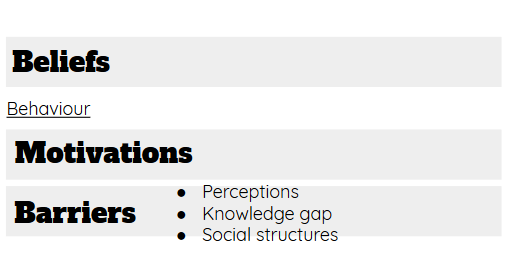 Beliefs
Beliefs
Some views that people may adopt towards sustainability include the belief that conservation attitudes are indicators of low status because the ability to consume indicates higher status. This view seems to apply more to the older generations who tended more to judge standards of living from material possessions.
A lot of people get so hung up on what they can’t have that they don’t think for a second about whether they really want it. (Lionel Shriver, 1989)
It is the preoccupation with possessions, more than anything else, that prevents us from living freely and nobly. (Bertrand Russell)
It seems plausible that for the current generation, the more generally held view is that environmentalism is a luxury. This is because many of the eco-apparels sold are priced higher than usual which makes it difficult for youths to afford. Hence, stakeholders focus on immediate needs first, following their purchase intentions before sparing a second thought for ecological concerns, if they do. Financial pursuits are often prioritised, at odds with environmental concerns. The question to engage in is, whether responsibilities lie more with the governments. If individuals should foot equal responsibilities, would you make a conscious choice to reduce your own comfort levels and stick to it?
Behaviour
Overview
Motivation
Barriers
1. Negative perceptions
- Some focus group participants believe that the quality and aesthetic of repurposed items do not match those of commercial items. As such, they would rather discard unwanted clothing instead of exploring creative ways to prolong its lifespan.
- There was also a general perception of environmental advocators, who carry out repurposing, as being less appealing as compared to mainstream fashion influencers. This deters participants who cares about their fashion style and appearances from identifying themselves with the behaviour of repurposing.
“Consumers are unable to see the connection between clothing consumption and the resultant waste that they produce,” furthermore, “People in Singapore are generally not aware of how and where they can recycle their old clothes”, says Ms Nuramirah Suyin Zaihan, an environmental engineer at the Singapore Environment Council (SEC).
When asked what could be done to extend the shelf life of their clothes, participants’ could provide responses revolving around restyling and repurposing. However, even when consumers acknowledge the negative effects of their consumption behaviour, a few participants resisted the idea of repurposing as they were not sure how to commit to the act. Focus group participants mentioned that they lack the technical skills required (e.g. sewing). This knowledge gap deters them from carrying out their repurposing ideas. They believed that repurposing is to be done by a skilled individual.
3. Social structures and activities
Lack of interaction with nature in cities does not help the development of identity with nature. As a result, people may identify with choices for their own benefits, prizing convenience over stepping up on efforts to recycle.
Moral of the story
Threats to nature can be addressed by care for nature but in order to care and act, people must be informed. There needs to be a feel of self-efficacy. We must actively obtain information and explore our potential to live with nature. Act now and help one another. Together, we develop a more environmentally gracious community.